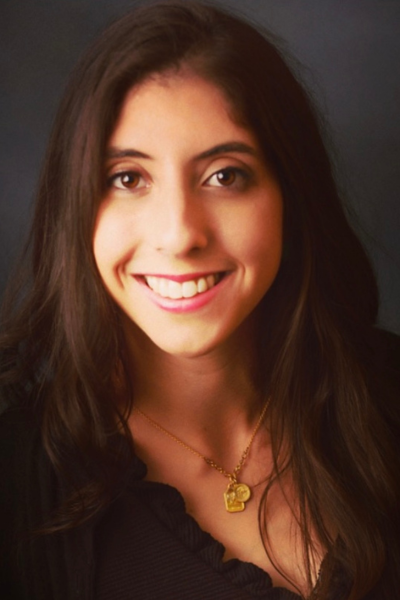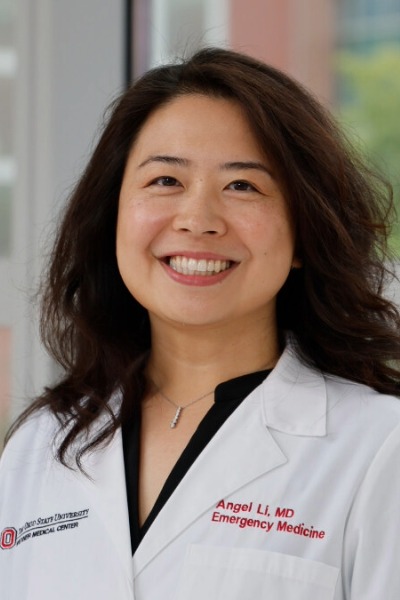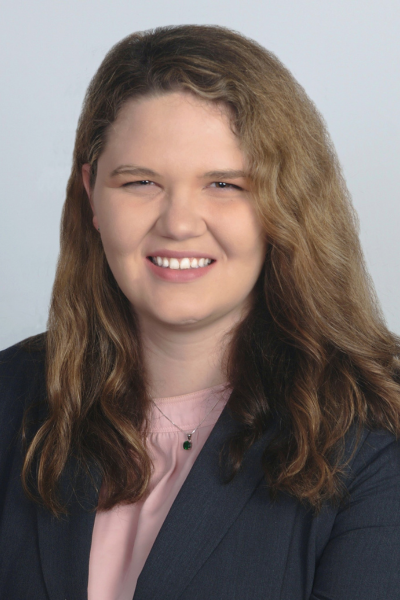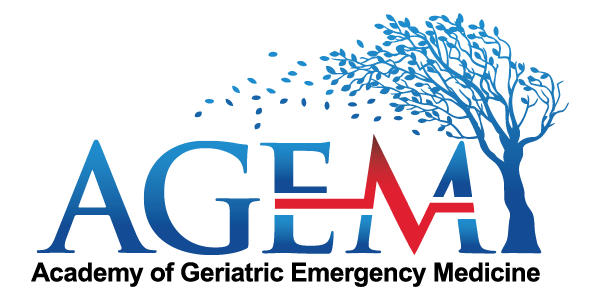Meet the AGEM Leaders!
-

-
 Cameron Gettel, MD, MHS
Cameron Gettel, MD, MHSPresident-Elect
Yale School of Medicine
Dr. Gettel is an assistant professor in the Department of Emergency Medicine at Yale University, a clinical investigator at the Yale Center for Outcomes Research and Evaluation (CORE), and co-director of the Yale Emergency Scholars Fellowship. His research focuses on improving emergency department care transitions for older adults by identifying and developing patient- and caregiver-reported outcome measures and designing interventions to enhance clinical outcomes.
At CORE, Dr. Gettel leads projects funded by the Centers for Medicare and Medicaid Services to develop the next generation of performance measures across multiple care settings. He earned a bachelor’s degree in biochemistry from Elizabethtown College and a medical degree from the Pennsylvania State University College of Medicine. He completed emergency medicine residency at Brown University, where he served as chief resident, and the National Clinician Scholars Program at Yale.
-
 Anita Chary, MD, PhD
Anita Chary, MD, PhDTreasurer
Baylor College of Medicine
Dr. Chary is a medical anthropologist and emergency physician at Baylor College of Medicine in Houston. She graduated summa cum laude from the University of Illinois at Urbana-Champaign and earned both her medical degree and a doctorate in anthropology from Washington University in St. Louis. She completed residency training at the Harvard Affiliated Emergency Medicine Residency, where she served as chief resident.
Dr. Chary’s research focuses on social determinants of health and the care of vulnerable populations. Her geriatrics work centers on emergency care for older adults with cognitive impairment and is supported by a GEMSSTAR award from the National Institute on Aging and the Geriatric Emergency care Applied Research (GEAR) Network. She previously served AGEM as a member at large on the executive committee and as an elected resident executive committee member. She currently chairs the research committee of the SAEM Academy of Diversity and Inclusion in Emergency Medicine. In this role, she leads collaborative initiatives to address ageism and ableism in clinical care and to improve the inclusion of minoritized older adults in emergency medicine research.
Dr. Chary also conducts global health research in Guatemala, where she studies child nutrition and development, chronic disease management, and innovative care models in rural Indigenous communities.
-
 Surriya Colleen Ahmad, MD
Surriya Colleen Ahmad, MDSecretary
Bellevue Hospital Center and Clinical Faculty
Dr. Ahmad is an attending physician at Bellevue Hospital Center and clinical faculty in the Ronald O. Perelman Department of Emergency Medicine at NYU Langone Health in New York City. She earned a Bachelor of Science in biology and Spanish from Emory University in Atlanta and received her medical degree from the University of Louisville in Kentucky. She completed a combined emergency medicine and internal medicine residency at SUNY Downstate Health Sciences University and Kings County Hospital Center in Brooklyn, followed by a fellowship in geriatric emergency medicine at Weill Cornell Medicine/NewYork-Presbyterian Hospital.
Dr. Ahmad has been a member of the Academy of Geriatric Emergency Medicine (AGEM) for four years. She has served on the AGEM Outreach Committee and on the AGEM Executive Committee as member at large, treasurer, and secretary.
-
 Katie Buck, MD, MPH
Katie Buck, MD, MPHImmediate Past President
The Ohio State University
Dr. Buck is an associate professor with tenure of emergency medicine at The Ohio State University. A highly successful clinical researcher, she specializes in geriatric emergency medicine and is currently funded by a National Institute on Aging (NIA) K76 Paul B. Beeson Emerging Leaders Career Development Award in Aging.
Dr. Buck earned her medical degree from the University of Virginia, where she was selected for the prestigious Medical Student Training in Aging Research (MSTAR) Program. She completed her emergency medicine residency at The Ohio State University (OSU), where she served as chief resident and received an Emergency Medicine Foundation/Emergency Medicine Resident Research Grant. Before graduating from residency, she secured her first NIH grant, receiving the NIA’s R03 Grants for Early Medical/Surgical Specialists’ Transition to Aging Research (GEMSSTAR) Grant. She subsequently completed the SAEM-approved research fellowship at OSU, focusing on clinical research for geriatric patients.
As an associate professor with tenure at OSU, Dr. Buck conducts clinical research in geriatric emergency medicine and mentors students, residents, and fellows in academic research. She has more than 40 peer-reviewed publications and has received multiple NIH-funded grants. Her research focuses on improving emergency care for older adults, developing innovative care models, and advancing geriatric emergency medicine as a specialized field. She is actively involved in several ongoing research projects, including studies on optimizing emergency department care for older adults and improving patient outcomes through targeted interventions.
Dr. Buck has been recognized at every stage of her career with numerous local and national research awards, including SAEM’s Academy of Geriatric Emergency Medicine (AGEM) Excellence in Geriatric Emergency Medicine Research Award, SAEM Resident Researcher of the Year, SAEM AGEM Early Career Achievement Award for Excellence in Research, and OSU’s Faculty Researcher of the Year in 2023.
Dr. Buck is an active member of SAEM and served as AGEM president in 2024-2025. Additionally, she has been selected for the Geriatric Emergency Department Accreditation Board of Governors. Through her research, leadership, and contributions to emergency medicine, Dr. Buck has established herself as a leading expert in geriatric emergency care, shaping the future of the field through her innovative work and dedication to advancing research and education.
-
 Ari Friedman, MD, PhD
Ari Friedman, MD, PhDMember-at-Large
University of Pennsylvania
As a health economist and emergency physician, I conduct research as well care for patients in a metropolitan Level I Trauma Center. My Ph.D. trained me to use statistical models to understand how care and outcomes change as a result of natural experiments and to understand how market forces drive emergency department (ED) crowding and access to alternative sites of unscheduled care like urgent care clinics.
I am now tenure-track faculty at the University of Pennsylvania in the Department of Emergency Medicine and the Department of Medical Ethics and Health Policy, and Senior Fellow at the Leonard Davis Institute. I work with geriatricians and geriatric neurologists regularly, have taken the PRIM-ER palliative emergency medicine short course, and collaborate with the Palliative and Advanced Illness Research Center on goals of care alignment for older adults in acute care settings. My NIA K23 project uses a novel cohort as well as electronic health record data to study the management, diagnoses, and outcomes of abdominal pain in older patients in EDs.
In turn, these early research efforts have led to a greater clinical understanding, which has driven my research agenda. I observed how the ED is a deliriogenic environment for patients with baseline vulnerabilities such as cognitive impairment and dementia, and am building tools to better identify patients at risk of delirium and pathways to improve and prioritize their care.
-
 Adrian Haimovich, MD, PhD
Adrian Haimovich, MD, PhDMember-at-Large
Beth Israel Deaconess Medical Center
Dr. Adrian Haimovich is an Assistant Professor of Emergency Medicine at Beth Israel Deaconess Medical Center and Director for Geriatric Emergency Medicine. He completed his MD and PhD at Yale University and postdoctoral T32 training in the Harvard Translational Research in Aging Program. His research focuses on improving care for older adults in the emergency department, particularly through the development of automated screening tools and decision support systems.
Dr. Haimovich has led innovative work at the intersection of geriatrics, emergency care, and data science. His recent projects include creating a novel screening tool to identify older ED patients at high risk for six-month mortality and developing pragmatic interventions to facilitate goals of care discussions. He has published extensively on topics such as automating risk stratification for geriatric syndromes and predictive analytics in emergency medicine. His work has been funded by a Harvard Catalyst K12 training award and a Geriatric Emergency care Applied Research Pilot Grant.
-
 Angel Li, MD
Angel Li, MDMember-at-Large
The Ohio State University
Dr. Li is an assistant professor of emergency medicine at The Ohio State University. Dr. Li is currently the chair for the AGEM membership committee and ACEP GEMS alternate councilor, and I have served on the AGEM executive board. Her noteworthy achievements include co-founding one of the first geriatric FOAMED programs for undergrad medical education with CDEM and spearheading GEMS first ACEP resolution: increased funding for geriatric emergency departments. Dr. Li is committed to advancing geriatric emergency medicine through research, education, and policy. Leveraging AGEM's core strengths, aiming to create enhanced opportunities for medical students, residents, and fellows, and fostering their professional growth. Dr. Li aspires to continue upholding the collaborative and supportive spirit of the AGEM community as a dedicated member at large.
-
 Rachel Skains, MD, MSPH
Rachel Skains, MD, MSPHMember-At-Large
University of Alabama
Dr. Skains is an assistant professor in the Department of Emergency Medicine (DEM) at the University of Alabama at Birmingham (UAB) with a joint faculty appointment at the Birmingham Veterans Affairs Medical Center (BVAMC). She is an early-stage investigator focused on improving the acute care of older adults through patient-centered outcomes research, specifically on delirium and medication safety. Dr. Skains was awarded the AHRQ NRSA T32 Postdoctoral Scholar Fellowship (2020-2022), in addition to funding through the UAB Integrative Center for Aging Research (ICAR) to examine the risk of delirium with opioid use among older adults in the ED and validate the nursing delirium screening scale (NuDESC) in the ED. Further, I completed the UAB Geriatric Scholar Interprofessional Program from 2019-2021 and attended the 2021 Network for Investigation of Delirium: Unifying Scientists (NIDUS) Bootcamp that both provided interdisciplinary geriatric educational sessions and specialty training in delirium. Dr. Skains recently been awarded two NIA awards: Grants for Early Medical/Surgical Specialists' Transition to Aging Research (GEMSSTAR) R03 (2023-2025) to evaluate the risk factors and time course of incident delirium among older adults in the ED and Exploratory/ Developmental Grant R21 (2023-2025) for comprehensive assessment of delirium risk due to medications. Furthermore, Dr. Skains is an emergency department physician champion for the UAB – Highlands and BVAMC Geriatric ED Committees, which received Level 1 (2021) and Level 3 (2023) accreditations respectively, served as Fellow board member for the Geriatric EM Section of ACEP (2021-2023) and currently chair of the AGEM Grants & Awards Subcommittee (2023-Present). Finally, I was awarded the 2023 SAEM AGEM Early Career Achievement Award, in addition to the UAB DEM Outstanding Researcher of the Year 2023.
-
 Sara Hurley, MD
Sara Hurley, MDResident Representative
The Ohio State University
Dr. Hurley is a second year emergency medicine resident at the Ohio State University in Columbus, Ohio. She completed medical school at the Johns Hopkins University in 2023. Dr. Hurley has been involved in geriatric emergency medicine research and scholarship since the beginning of residency. Dr. Hurley is currently involved in a project investigating the acceptability of a partnership between the Ohio State University East Hospital and Franklin County Office on Aging. Dr. Hurley is also interested in studying ways to best screen for elder abuse in the emergency department. Going forward, she hopes to complete a geriatrics fellowship and continue to spread my passion for caring for our geriatric population.
-
 Erin Hunt
Erin HuntMedical Student Representative
The Ohio State University
Erin Hunt grew up in Stroudsburg, Pennsylvania—a small town in the Poconos—alongside her parents and younger brother. After high school, Erin attended East Stroudsburg University, where she earned a Bachelor of Science in Biology. During college, Erin became an EMT and spent 4 years working in EMS, which sparked my interest in EM. This interest has only deepened since starting medical school at the Ohio State University. As Erin advances in her medical career, she hopes to find a path that combines my passion for EM with a commitment to improving care for the aging population and individuals with disabilities. -
 Audrey Lam
Audrey LamMedical Student Representative
Oakland University William Beaumont School of Medicine
Audrey Lam is a second-year medical student at the Oakland University William Beaumont School of Medicine and a graduate of the USC Leonard Davis School of Gerontology. During her four years as an EMT with USC Emergency Medical Services (EMSC), Audrey served as the associate director, implemented a geriatric curriculum, and led EMTs in teaching first aid at a retirement community—a first in EMSC’s history. Audrey's passions in gerontology and EMS led me to join Cedars-Sinai’s Geriatric ED Quality Improvement Committee towards GED accreditation. Reflecting upon her ED volunteer experience, Audrey identified ways to optimize our volunteer structure to better fulfill older patients’ needs. Audrey collaborated with interdisciplinary healthcare leaders to innovate Cedars-Sinai’s first age-friendly volunteer program and presented at ACEP and to the Institute of Healthcare Improvement on how our 3,600 hours of supportive interventions decreased restraint usage and calmed agitated patients. Audrey learned that collaborative committees, like these, are capable of shifting entire cultures and mobilizing resources to structurally improve care for marginalized communities. Audrey has additionally presented at the National Collegiate Emergency Medical Services Foundation Conference for three years about age-friendly, culturally-sensitive EMS care. As the recipient of the NIA-funded Medical Student Training in Aging Research (MSTAR) grant at UCLA, she researched ethnogeriatrics with Dr. David Reuben and was selected to be their 2024 Murray H. Neidorf MSTAR Scholar. Audrey is grateful and excited for the opportunity to collaborate and advance age-friendly care for underrepresented communities in emergency medicine across medical schools.
